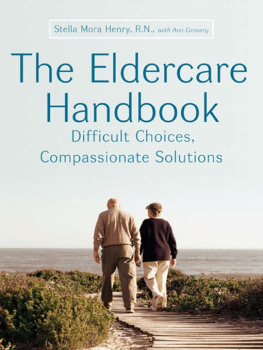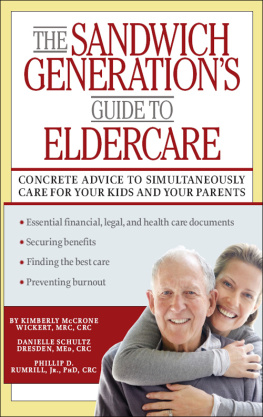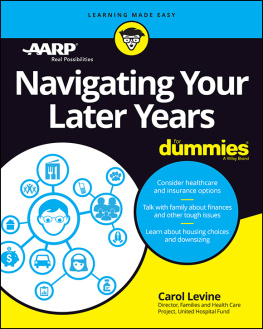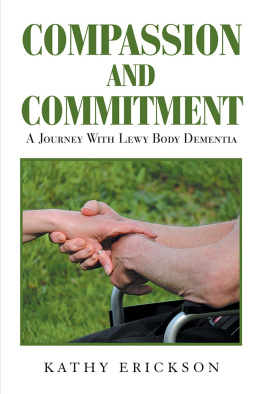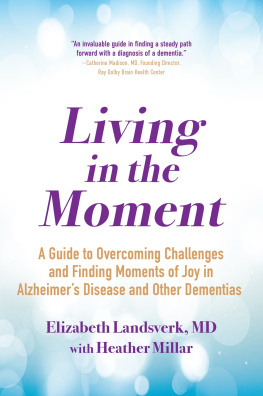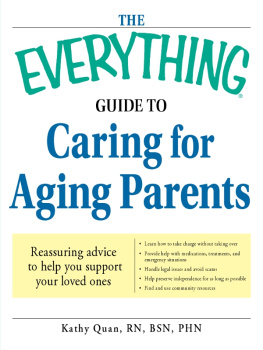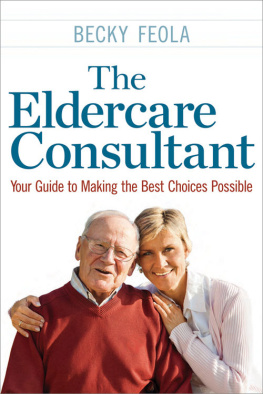THE ELDERCARE HANDBOOK
Difficult Choices,
Compassionate Solutions
STELLA MORA HENRY, R.N.,
with Ann Convery

medical disclaimer
This book contains advice and information relating to health care. It is not intended to replace medical advice and should be used to supplement rather than replace regular care by your doctor. It is recommended that you seek your physicians advice before embarking on any medical program or treatment.
All efforts have been made to ensure the accuracy of the information contained in this book as of the date published. The authors and the publisher expressly disclaim responsibility for any adverse effects arising from the use or application of the information contained herein.
privacy disclaimer
The names and identifying characteristics of parents and children featured throughout this book have been changed to protect their privacy.
For my husband, Terry, father of our pride and joy,
Christopher: Thank you for our 26-year partnership at Vista del Sol.
You have been my anchor and have provided me the opportunity to
learn daily from our residents and their families.
SMH
This book is dedicated to my mother, Ann Holcombe Convery, who
daily inspires me with her elegant, unquenchable passion for life.
AC
O n November 11, 1969, I accepted my first position as director of nurses in a long-term-care facility. At twenty-two years of age, I had no nursing home experience; nonetheless, Mrs. Helen Hosman, the owner, took a chance on me. Thank you, Mrs. Hosman, for allowing me to start a journey I continue to this day. My wholehearted appreciation to the thousands of families with whom I have shared this road for allowing me to join you in your caregiving travels. To Ann Convery, I owe my heartfelt thanks for challenging me to share my experiences with others, never doubting for a moment the potential of this work. You sat hour after hour drawing this information out of me and onto paper; I am profoundly grateful. To my publicist, Anthony Mora, my appreciation for obtaining consistent media opportunities which have allowed me to shed light on eldercare issues. To Sue Brantley, thank you for your friendship and expert editing skills, which considerably enriched the book. To Harriet Bell, vice president and publisher, William Morrow Cookbooks, who had confidence in an unknown writer and allowed me to share my message, and to Toni Sciarra, my editor at HarperCollins, who recognized my style and allowed me to communicate in my own voicemy sincere gratitude. To my sister, Pat Moramy rock throughout this process: I am ever grateful for your continued confidence, valuable suggestions, and cheerleading skills. Christopher, thank you for understanding the importance of this project, for sharing your mothers time for the last five years, and for being a loving, helpful grandson to your beloved grandparents. You are more precious to me than you will ever know. And to my husband, Terry, without whose help I would never have been able to be the caregiver my parents needed me to be: Thank you for your love, patience, and support. You are always there for me. Finally, to Estella and Raul Mora, my treasured parents: Thank you for your unconditional love, your wisdom, and your unquestioning faith in me. I miss you daily.
INTRODUCTION:
WHAT MY FATHER TAUGHT ME
H undreds of times I have watched hesitant families fearfully move their parents into long-term care. Yet only when I began my personal journey of relocating my own mother did I completely understand the anxiety and guilt that accompany this move.
For the past twenty-six years, my husband, Terry, and I have served as cofounders and directors of Vista del Sol Skilled Nursing and Assisted Living Facility in Los Angeles. Over the years, I have tried to anticipate families needs to make transitions as smooth as possible. I have been guide, administrator, confidante, but none of these roles prepared me for moving my own mother.
At eighty-five, my mother walked more unsteadily as each day went by. Alzheimers had taken her recent and long-term memories; Mom literally lived in the momentno yesterdays to draw from, no thought of the future. She did take great pride in having reached eighty-five years of age and would remind me of it every fifteen minutes.
Moving my mother out of the apartment she had lived in for forty years was the responsible, conscientious, dutiful decision. Still, it felt strange. Until I began this personal journey, I truly thought I understood what families were going through. For years, as I kept silent watch over apprehensive daughters and sons, I would think, They must be having a tough time arranging the move. Little did I know. Relocating Mom opened new thresholds of guilt, fear, and anxiety. Only as I lay awake nights wondering if Id thought of everythingwould she be happy, would she miss her home, would she be angry at medid I truly know what it meant to move a parent into long-term care.
A parade of details needed attention. After deciding the date for my mothers move, I arranged for the phone and cable TV to be connected and coordinated the furniture transfer, personalizing her room before she arrived. I chose clothing she would need, decided which pictures would have the most meaning, and arranged for Bluey, her parakeet, to be carefully transported.
As I checked off task after task, I forgot I was a registered nurse and a facility administrator. I was a daughter, an adult caregiver. Every shred of love, fear, and regret I had seen repeated in the tired, confused faces of families who had come to my office, I now felt about moving my own mother. All of us wonder if were doing the right thing.
It Doesnt Feel Right
I know I made the right decision. Since a live-in daily companion could no longer address her escalating medical needs, Mom was no longer safe at home. As she grew older, the danger of a medical emergency had shadowed her days. Now, she would be safe and receive twenty-four hour professional care. Knowing that a licensed nurse would evaluate her medical needs twenty-four hours a day brought me a deep sense of relief.
Still, there were times when it just didnt feel right. The guilt we feel about moving a parent into long-term care is a normal part of the process; I see it in almost everyone who visits my office. Though I wasnt personally surprised by the guilt, it upset me all the same. These thoughts raced through my mind:
Maybe I can still make it work for Mom at home.
Can she live with my family?
She raised four of us; now we cant take care of her?
Is it a good idea to uproot my mother from familiar surroundings after forty years?
What would my father say about this decision?
Strangely, it was my father who taught me when and how to make the responsible choice for my mother.
My Father Stayed at Home
In 1990, my seventy-eight-year-old father was diagnosed with Alzheimers. During the next three years, Dads cognitive abilities declined rapidly, recent memory going first, followed by poor decision making. Soon, he required assistance with medication management, dressing, bathing, and toileting. Twice, he wandered away from home, frightening the whole family.
I can take care of your dad at home, my mother pleaded with me. Just give me a little help, and well be fine. The five-hour-a-day help turned into eight hours, followed by twenty-four-hour help, seven days a week. My father, a large man even though he had lost a lot of weight, required two people to transfer him in and out of a chair. He needed total nursing care.

